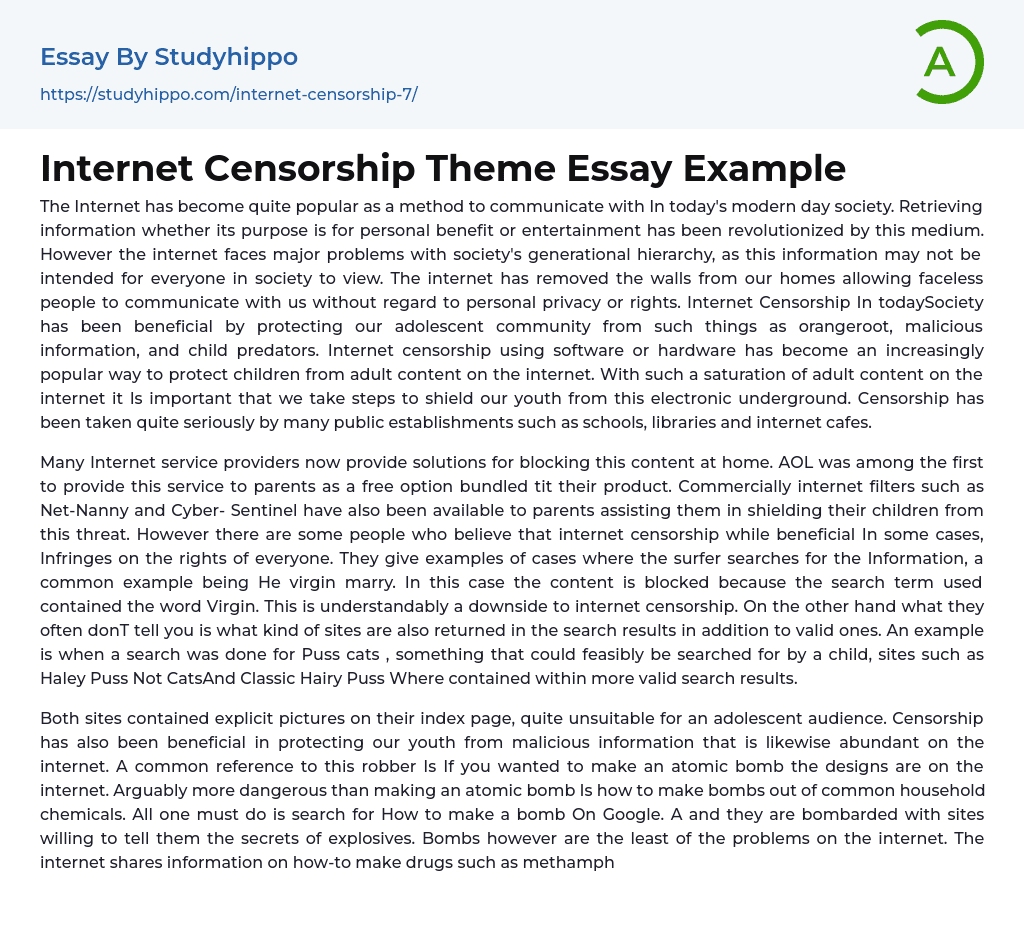The Internet has become highly popular for communication in modern society, revolutionizing access to information. However, it faces challenges due to societal hierarchy, as not all information is suitable for everyone. The Internet breaks physical barriers and allows anonymous individuals to disregard personal privacy and rights when interacting with us. In today's society, internet censorship plays a vital role in protecting youth from harmful content such as explicit material, malicious information, and predators. The use of software or hardware for internet censorship is increasingly popular to prevent children from accessing inappropriate online content. To safeguard our younger generation from the digital underworld of adult material prevalent on the internet, it is crucial that we proactively implement protective measures in public institutions like schools, libraries, and internet cafes.
Seve
...ral Internet service providers now offer solutions for blocking explicit content at home. AOL was one of the first to provide this service to parents as a free option bundled with their product. Commercial internet filters such as Net-Nanny and Cyber-Sentinel have also been available to parents, assisting them in protecting their children from online threats. Nonetheless, some argue that internet censorship, while beneficial in certain cases, encroaches upon everyone's rights. They give examples of situations where users search for information about the Virgin Mary. In these instances, the content may be blocked simply because the search term contains the word "Virgin," which is a notable drawback of internet censorship. On the other hand, critics often neglect to mention the type of websites that appear in search results alongside legitimate ones. For instance, when searching for "Puss cats," a search potentially performed by a child, sites such
as "Haley Puss Not Cats" and "Classic Hairy Puss" were included in the search results along with more appropriate options.
Both websites featured explicit images on their homepage, which is inappropriate for young audiences. Censorship serves to safeguard young individuals from readily available harmful information on the internet. For instance, there are online instructions for constructing an atomic bomb, a widely acknowledged hazard. However, even more troubling is the simplicity of finding guides for creating bombs using common household chemicals through a basic Google search. Numerous websites furnish comprehensive details regarding explosive production. Yet, bombs represent just one among various predicaments present on the internet. The web also offers knowledge on manufacturing drugs such as methamphetamine, ecstasy, acid, and even cocaine. Sharing drug-related information has surged by an alarming 577% since 1995. It is absolutely vital to censor this information from young people's access. Furthermore, aside from adult content and perilous data, the internet has become fertile ground for another grave danger to our youth: online child predators.
The internet is increasingly being utilized by a new kind of criminals who engage in unlawful activities. These offenders frequently assume the role of teenagers within chat rooms or other instant messaging platforms, aiming to establish trust with their targets and persuade them into meeting face-to-face. As reported by the National Center for Missing and Exploited Children, 20% of internet users below 7 years old receive online solicitations or approaches, while 3% encounter forceful sexual solicitations that entail offline contact or requests for offline contact.
To safeguard our young generation from internet dangers, there is no pre-made solution available. Hence, active supervision of children's online activities by
parents becomes crucial. The safest approaches to address this concern involve monitoring and censoring since the internet carries valuable information along with hidden risks. In this way, censorship plays a vital role in protecting our teenage community.
Boxed solutions in both hardware and software form are a positive initial step to address this issue. Yet, it is undeniable that parents must play an active part in monitoring their children's online activities. We must educate our youngsters, as there will inevitably be instances where access to restricted content is possible. Ultimately, safeguarding children's online well-being is crucial, and censorship, in its various forms, will play a pivotal role in achieving this goal.
- Email essays
- Hypertext Transfer Protocol essays
- Marshall Mcluhan essays
- Virtual Learning Environment essays
- Web Search essays
- Etiquette essays
- Mainstream essays
- Vodafone essays
- Web Search Engine essays
- Affirmative Action essays
- Assisted Suicide essays
- Capital Punishment essays
- Censorship essays
- Child Labour essays
- Child Protection essays
- Civil Rights essays
- Corporal Punishment essays
- Death Penalty essays
- Empowerment essays
- Euthanasia essays
- Gay Marriage essays
- Gun Control essays
- Human Trafficking essays
- Police Brutality essays
- Privacy essays
- Sex Trafficking essays
- Speech essays
- Child essays
- Child labor essays
- Childcare essays
- Android essays
- Application Software essays
- Benchmark essays
- Computer Network essays
- Computer Programming essays
- Computer Security essays
- Computer Software essays
- Cryptography essays
- Data collection essays
- Data Mining essays
- Graphic Design essays
- Information Systems essays
- Internet essays
- Network Security essays
- Website essays
- World Wide Web essays




